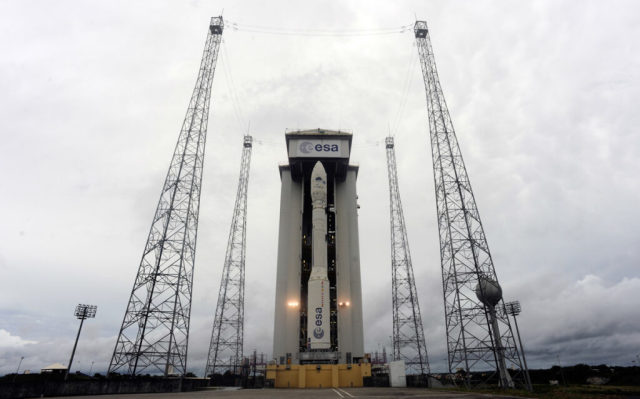It should launch the first satellite from the new constellation of Earth monitoring devices into orbit
PARIS, April 21. /TASS/. The corporation-operator of rocket launches in France Arianespace told Agence France-Presse on Wednesday that the next launch of the European Vega light rocket will be carried out next week from the spaceport in Kourou (French Guiana), on the night of April 28 to 29. This is stated in the AFP information.
During the upcoming 18th flight, the rocket is to launch the first satellite from the new constellation of Earth monitoring devices, called Pl iades Neo, into orbit. In total, it will have four satellites. The customer is Airbus Defense and Space Corporation.
Also on board will be five mini-satellites, which will be placed in orbit using the newly created and already tested last year system SSMS-satellite dispenser. Among them are an Earth monitoring device for the Norwegian Space Agency and a satellite for the French operator Eutelsat, which provides satellite communication services. All the vehicles launched by the rocket will be placed in sun-synchronous orbits (in the range of altitudes from 613 to 621 km).
The previous attempt to launch the Vega rocket ended in failure on November 17 last year - the rocket fell to the ground shortly after launch. Two satellites were destroyed - Spanish and French. As an independent commission of inquiry found out, the rocket crash was caused by an error made at the factory of the Italian manufacturer Avio during the installation of the fourth stage. An incorrect connection of the wires was made, which the subsequent control check did not reveal.
"After the incident that occurred in November, Avio carried out in-depth work in order to ensure the resumption of flights of the rocket. This work was monitored by Arianespace and the European Space Agency in order to ensure the reliability of the production technologies used and the quality of the carrier. We have acted without haste and are ready to launch the rocket next week, " Arianespace CEO Stefan Israel told AFP.
He said that the French satellite, which will launch the rocket into orbit, "was created on the basis of the most advanced technologies in the field of Earth monitoring in terms of the resolution of images."

